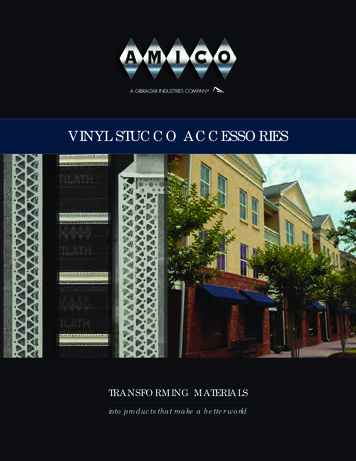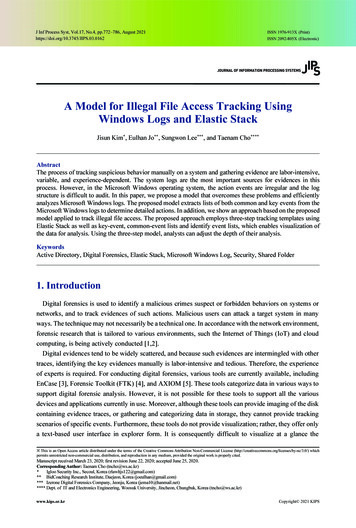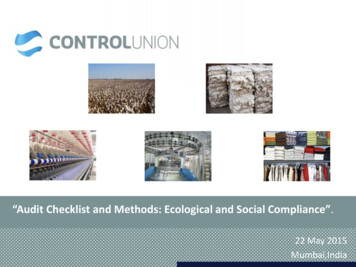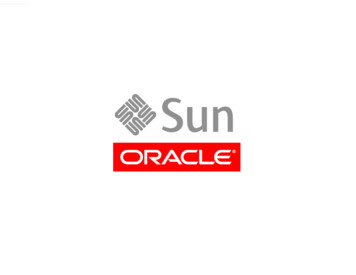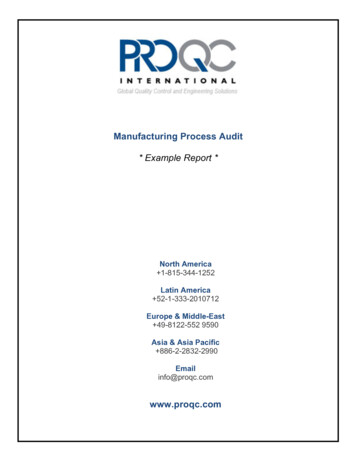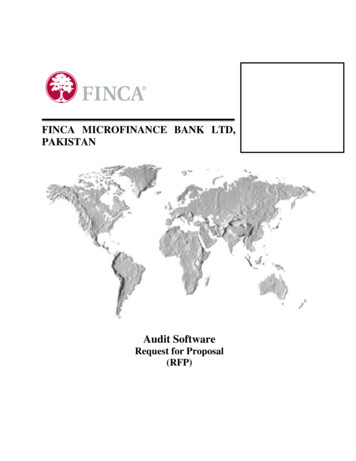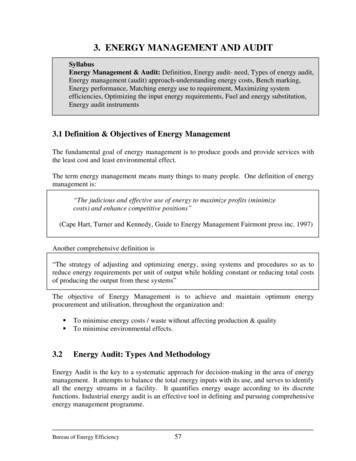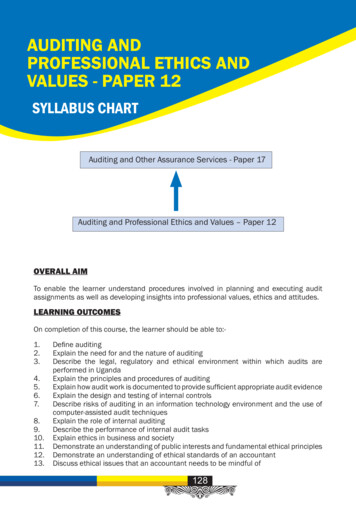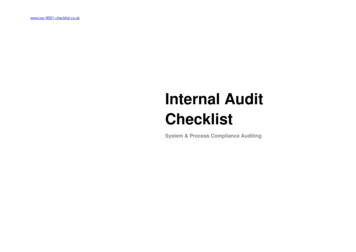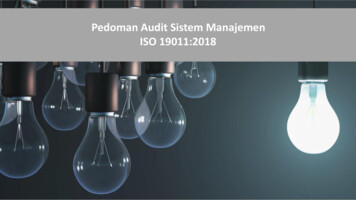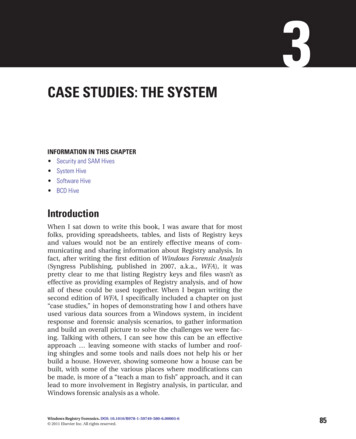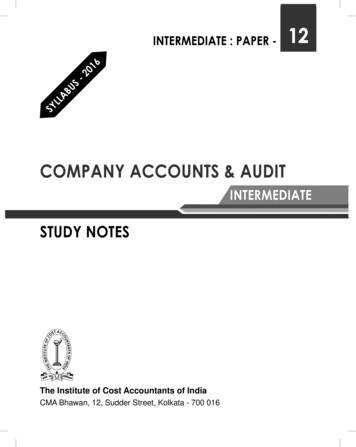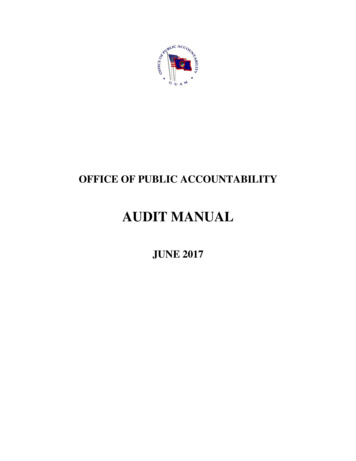
Transcription
OFFICE OF PUBLIC ACCOUNTABILITYAUDIT MANUALJUNE 2017
TABLE OF CONTENTSINTRODUCTION. 5CHAPTER 1: PERFORMANCE AUDIT GENERAL STANDARDS . 81.0 Purpose. 81.1 Maintaining Independence. 81.2 Planning . 81.3 OPA Resources . 81.4 Assuring Staff Qualifications . 81.5 Directing and Controlling . 81.6 Sufficient, Appropriate Evidence . 91.7 Audit Documentation. 91.8 Reporting . 101.9 Confidentiality of OPA Audit Documentation . 101.10 Maintaining Quality Assurance . 11CHAPTER 2: PHASE 1- ANNUAL AUDIT PLANNING . 132.0 Purpose. 132.1 Background . 132.2 Standards . 132.3 Policy . 142.4 Planning Guidance . 142.5 Annual Plan Development. 142.6 Annual Audit Plan . 16CHAPTER 3: PHASE 2- PROJECT INITIATION . 173.0 Purpose . 173.1 Standards . 173.2 Policy . 183.3 Audit Team Assignment . 183.4 Auditor Independence . 183.5 Engagement Letter. 18Page 1 Effective June 2017
CHAPTER 4: PHASE 3- SURVEY. 204.0 Purpose. 204.1 Standards . 204.2 Policy . 204.3 Planning the Survey . 204.4 Survey Program . 214.5 Entrance Conference . 214.6 Survey Approach . 214.7 Information Gathering Techniques. 224.8 Evaluating Survey Results . 234.9 Survey Completion . 244.10 Closeout Conference . 25CHAPTER 5: PHASE 4- AUDIT PLANNING . 265.0 Purpose. 265.1 Standards . 265.2 Policy . 275.3 Detailed Audit Program . 275.4 Audit Planning Memorandum . 285.5 Approval and Retention of Planning Memorandum and Audit Program . 305.6 Access to Planning Documents . 30CHAPTER 6: PHASE 5- FIELDWORK. 316.0 Purpose. 316.1 Standards . 316.2 Policy . 316.3 Main Steps in Fieldwork . 316.4 Adequate Supervision . 316.5 Internal Control . 326.6 Information Systems Controls . 326.7 Provisions of Laws, Regulations, Contracts, and Grant Agreements . 326.8 Fraud . 336.9 Abuse . 336.10 Ongoing Investigations and Legal Proceedings . 34Page 2 Effective June 2017
6.11 Audit Sampling. 346.12 Data Gathering . 356.13 Developing, Documenting, and Communicating Audit Findings . 356.14 Audit Recommendations . 37CHAPTER 7: PHASE 6- REPORTING . 397.0 Purpose. 397.1 Reporting Standards . 397.2 Standards for Performance Audit Report Contents. 397.3 Policy . 417.4 Report Categories . 427.5 Report Types . 437.6 Report Attributes . 437.7 OPA Performance Audit Report Contents . 457.8 Letter Report Contents. 527.9 Report Format and Presentation . 537.10 Quality Control and Assurance Review. 547.11 Report Distribution & Transmittal Letters. 57CHAPTER 8: PHASE 7- CLOSE-OUT . 598.0 Purpose. 598.1 Standards . 598.2 Policy . 598.3 Lessons Learned Preparation and Presentation . 598.4 Media Coverage . 608.5 Finalize Audit Documentation within TeamMate . 608.6 Back-Up Audit File . 618.7 Close-Out and Push to Team Central . 61CHAPTER 9: PHASE 8- FOLLOW-UP . 629.0 Purpose. 629.1 Background . 629.2 Standards . 629.3 Policy . 639.4 Follow-up Procedures . 63Page 3 Effective June 2017
9.5 Corrective Action Plans. 639.6 Final Action . 649.7 Follow-Up Responsibility . 649.8 Procedures for Corrective Action Plans . 65CHAPTER 10: AUDIT DOCUMENTATION PREPARATION GUIDELINES . 6710.0 Purpose. 6710.1 Background . 6710.2 Standards . 6710.3 Policy . 6810.4 Guidance . 6810.5 Cross-Indexing/Cross-Referencing . 6910.6 Review of Audit Documentation . 7010.7 Access to Audit Documentation . 7110.8 Storage and Disposition of Audit Documentation. 71Page 4 Effective June 2017
INTRODUCTIONThese guidelines are intended to be the basis for conducting audits within the Office of PublicAccountability (OPA). However, nothing in these procedures is intended to be a substitute for theprofessional judgment of the Auditor.The OPA follows Generally Accepted Government Auditing Standards (GAGAS or Yellow Book)as set forth by the Comptroller General of the United States and standards of the American Instituteof Certified Public Accountants (AICPA). Where applicable, OPA also follows the InternationalStandards of Supreme Audit Institutions (ISSAI) issued by the International Organization ofSupreme Audit Institutions (INTOSAI). Further, the OPA maintains an ethics policy, which has theAICPA Code of Professional Conduct and Association of Government Accountants (AGA) Code ofEthics as its foundation. It is the responsibility of each Auditor to familiarize himself/herself withthese standards and policies.The OPA is responsible for two types of audits within the Government of Guam (GovGuam): Financial Audits (audits of transactions) Performance Audits (audits of economy, efficiency, and effectiveness and/or compliancewith performance or other standards)The OPA has oversight responsibilities of audits of all agencies, bureaus, commissions, andprograms within GovGuam, including all three branches of government. Notwithstanding the above,the terms Agency or Agencies will be used in these procedures to include agencies, bureaus,departments, instrumentalities, commissions, programs, semi-autonomous, and autonomousagencies of GovGuam.Financial Audits (Audits of Transactions)Historically, local Certified Public Accounting (CPA) firms have performed Financial Audits. Thispolicy will continue unless otherwise designated by the Public Auditor. The Public Auditor, whereappropriate, will be a signatory on all audit contracts and must receive a copy of all correspondencebetween the auditee and the CPA firm. The CPA firm shall include the Public Auditor in all auditstatus conferences in which significant audit issues are discussed.Any firm who contracts with GovGuam to perform a Financial Audit is responsible for the following: Preparing a report determining whether or not the financial statements areprepared in accordance with the established criteria; Ensuring compliance with the Office of Management and Budget’s Uniform Guidance,if applicable; Preparing a letter of recommendations to management; Preparing reports indicating whether the Agency has complied with specificcompliance requirements; and Any other report as contracted.Page 5 Effective June 2017
Performance Audits (Audits of economy, efficiency, effectiveness, and/or compliance withperformance or other standards)A Performance Audit is an objective and systematic examination of evidence for the purpose ofproviding an independent assessment of the performance of a Government organization, program,activity, or function in order to provide information to improve public accountability and facilitatedecision-making by parties with responsibility to oversee or initiate corrective action.Performance audits consist of two types of audits: (1) economy, efficiency, and effectiveness and (2)compliance with performance or other standards. Because most audits performed by the OPAinclude aspects of both types of audits, the OPA will refer to all audits conducted under Chapters 7& 8 of the Yellow Book as “Performance Audits.” OPA develops an Annual Audit Plan for auditsto be conducted during the year. However, OPA’s priorities may change any time during the yeardue to the passage of laws, requests by elected and public officials, the changing needs of GovGuam,and other developments.Investigative audits, a subset of performance audits, may be performed when a need is presented tothe OPA to evaluate an allegation of waste or abuse of government resources. Investigative Auditshave a very narrow scope subject and feature focused testing designed to uncover the waste or abuse.The purpose of Investigative Audits is to determine whether or not the evidence gathered supportsthe allegation received by the OPA. Investigative audits are not performed with the intent ofuncovering fraud or other illegalities.Referrals to perform performance audits will generally be obtained from the following: 1) Referralsfrom elected officials acting on behalf of their constituents, 2) Referrals received directly by OPAfrom members of the general public, and 3) Issues arising from a management letter or compliancereport received in conjunction with a financial audit.Phases of a Performance AuditPerformance auditors are faced with a considerable variety in their work and are often placed in aposition where they need to exercise their professional judgment carefully in making planningdecisions, developing test programs, forming conclusions, and constructing recommendations.They must often become familiar with a wide range of organizational contexts and subject matters.They need the ability to write reports on complex subject matters in a manner that can beunderstood by a wide audience. Performance auditors must develop skills far beyond that can begained from a manual.This manual discusses the phases of a performance audit, and OPA’s general policies and standardsto be met as they relate to the phases as illustrated in Figure 1.Page 6 Effective June 2017
Figure 1. Phases of a Performance AuditPage 7 Effective June 2017
CHAPTER 1:PERFORMANCE AUDIT GENERAL STANDARDS1.0 PurposeThis chapter sets forth the general standards adopted by OPA to carry out the office’s activities andfunctions with independence, professionalism, and integrity.1.1 Maintaining IndependenceIn all matters relating to the audit work, the audit organization, the Public Auditor, and the OPA staffinvolved in performing or supervising the assignment, must be free from personal or externalimpairments to independence and shall consistently maintain an independent attitude andappearance. [GAGAS 3.02 through 3.26]The auditor and the Supreme Audit Institution (SAI) must be independent; the auditor and the SAImust possess the required competence; and the auditor and the SAI must exercise due care andconcern in complying with the INTOSAI Auditing Standards. This embraces due care in planning,specifying, gathering and evaluating evidence, and in reporting findings, conclusions andrecommendations’. [INTOSAI Fundamental Principles of Public Sector Auditing ISSAI 100- 35through 40]1.2 PlanningThe OPA shall maintain a planning system for assessing the nature, scope, trends, vulnerabilities,special problems, and inherent risks of Government programs and operations and for use inestablishing the goals, objectives, and tasks to be accomplished by the OPA within a specific timeperiod. [GAGAS 6.06 through 6.12]Auditors should select audit topics through the SAI’s strategic planning process by analyzing potentialtopics and conducting research to identify risks and problems; and plan and manage the auditengagement to carry out high-quality audit work efficiently, effectively, and timely. [INTOSAIFundamental Principles of Performance Auditing ISSAI 300-36-37]1.3 OPA ResourcesThe OPA management team is responsible for assisting the OPA in assuring that the office resourcesare effectively, efficiently, economically, ethically, and equitably deployed. [GAGAS 1.01 andA1.08(a) through A1.08(h)]1.4 Assuring Staff QualificationsOPA staff shall collectively possess a variety of knowledge, skills, and experience needed toaccomplish the OPA mission and audit objective. [GAGAS 3.72(a) through 3.72(d)(5) and 6.45(a)through 6.45(d)]1.5 Directing and Controllinga. The OPA management team shall direct and control OPA operations to assure that: (i) allactivities are adequately supervised, (ii) performance is consistent with professionalstandards, and (iii) periodic internal assessments are made of OPA activities andPage 8 Effective June 2017
accomplishments. [GAGAS 6.53 to 6.55]b. The audit staff is to be properly supervised from the start of planning through the completionof fieldwork and reporting to ensure that the work conforms with Government AuditingStandards and OPA policies. The level and detail of supervision will depend on theexperience and training of the staff and the complexity of the assignment. Supervisoryresponsibilities are spelled out throughout this chapter. The Auditor-In-Charge (AIC) and/orthe Audit Supervisor should ensure that (i) conformance with audit standards is obtained, (ii)audit programs are followed, unless changes are justified, authorized and documented, (iii)the audit work is conducted with due professional care, (iv) the audit documentationadequately support findings and conclusions and provide sufficient data to prepare ameaningful report, (v) the audit objectives are met, and (vi) supervisory reviews are timely.c. The work of the audit staff at each level and audit phase should be properly supervised duringthe audit, and documented work should be reviewed by a senior member of the audit staff.[INTOSAI Performance Audit Standards ISSAI 3000, 72]1.6 Sufficient, Appropriate Evidencea. Auditors must obtain sufficient, appropriate evidence to provide a reasonable basis fortheir findings and conclusions. [GAGAS 6.56 to 6.72]b. Appropriateness is the measure of the quality of evidence that encompasses its relevance,validity, and reliability in providing support for findings and conclusions related to theaudit objectives. [GAGAS 6.60 to 6.66]c. Sufficiency is a measure of the quantity of evidence used to support the findings andconclusions related to the audit objectives. [GAGAS 6.67 to 6.68]1.7 Audit Documentationa. Auditors must prepare audit documentation related to planning, conducting, and reportingfor each audit. Such documentation should be prepared in sufficient detail to enable anexperienced auditor, having no previous connection to the audit, to understand from theaudit documentation the nature, timing, extent, and results of audit procedures performed,the audit evidence obtained and its source and the conclusions reached, including evidencethat supports the auditors’ significant judgments and conclusions. [GAGAS 6.79 andINTOSAI Performance Audit Standards ISSAI 300- 34]b. Auditors should prepare audit documentation that contains evidence of the audit qualityand supports the findings, conclusions, and recommendations before they issue their report.[GAGAS 6.80 to 6.85]c. When auditors do not comply with applicable GAGAS requirements due to law, regulation,scope limitations, restrictions on access to records, or other issues impacting the audit, theauditors should document the departure from the GAGAS requirements and the impact onthe audit and on the auditors’ conclusions. [GAGAS 6.84]Page 9 Effective June 2017
1.8 Reportinga. The Public Auditor shall provide an annual report to the Governor of Guam and the Speakerof the Legislature within 90 days of the close of the calendar year1, such report to includerecommendations for necessary legislation to improve and protect the integrity of the financialtransactions and condition of GovGuam. [1 GCA § 1909(f)]b. In addition, the Public Auditor shall provide a copy of all audits to all news media on Guam,as well as publish the audit on the Internet. [1 GCA § 1920]c. Further, the Public Auditor shall submit to I Liheslaturan Guåhan on a continuous basisrecommendations with respect to altering and amending the performance standards assignedto any government of Guam program, as well as recommendations with respect to proceduresfor evaluating compliance with or achievement of performance standards. Upon enactment ofa law implementing a program and performance-based budget for the entire GovGuam, OPAshall implement a continuous program of evaluation and justification review of all GovGuamagencies and shall submit a report of evaluation and justification review findings andrecommendations to the Speaker of I Liheslaturan Guåhan, I Maga’Lahen Guåhan, the headof the agency that was the subject of the review, and the head of any agency that issubstantially affected by the findings and recommendations. Every agency, department andprogram of the government of Guam must be reviewed at least once annually, and a reportmust be made to I Liheslaturan Guåhan at least four (4) months prior to the end of a fiscalyear. [1 GCA § 1915]1.9 Confidentiality of OPA Audit DocumentationThe OPA shall establish and follow procedures for safeguarding and protecting all auditdocumentation, the identity of confidential sources, and privileged and confidential information.Specifically, confidential sources shall not have their identity revealed without their consent, andconfidential or privileged information shall not be disclosed unless required by law. [1 GCA §1909.1]1 GCA § 1909.1. Confidentiality of Investigations. (a) Except pursuant to a subpoenaissued by a court of competent jurisdiction for good cause shown, or the powersafforded I Liheslaturan Guåhan [the Legislature] under Legislative InvestigativePowers, 2 GCA Chapter 3, the Public Auditor shall not be required to disclose anyworking papers. For the purposes of this Section, working papers means the notes,internal memoranda and records of work performed by the Public Auditor on auditsand other investigations made pursuant to this Chapter, including any and all projectevidence collected and developed by the Public Auditor.(b) Information received by the Public Auditor alleging criminal activity or allegingwrongful use of government funds or property is privileged. Neither the Public11 GCA § 1909(f) states that the annual report is due within 90 days after the close of each government fiscal year.However, the Public Auditor has made it an internal policy to track the office’s performance and report issuances ona calendar year basis with the goal to release the annual report no later than March 31st of each year for the precedingyear’s activities.Page 10 Effective June 2017
Auditor nor any person employed by the Public Auditor shall disclose the identity ofthe person providing that information, unless such failure to disclose infringes uponthe Constitutional rights of the accused. Nor shall the Public Auditor, nor any personemployed by the Public Auditor, be required to produce any records, documentaryevidence, opinions or decisions relative to such privileged communication orinformation:(1) In connection with any criminal case, criminal proceeding or anyadministrative hearing of whatever nature, or(2) By way of any discovery procedure.(c) Any person arrested or charged with a criminal offense may petition the Court foran in camera inspection of the records of a privileged communication or informationreceived by the Public Auditor, and which is material to the criminal charge broughtagainst the person. The petition shall allege facts showing that such records would:(1) Provide evidence favorable to the accused;(2) Be relative to the issue of guilt; and(3) Cause a deprivation of a constitutional right if such communication orinformation is not disclosed. If on the basis of such criteria, the Courtdetermines that the person is entitled to all or any part of such records, it mayorder its production and disclosure to the degree necessary, protecting to theextent possible, the identity of the person who has informed the Public Auditorof such matter.(d) Disclosure of a privileged communication or privileged information in violationof this Section shall be a felony of the third degree.1.10 Maintaining Quality Assurancea. All work performed by the OPA shall be in conformity with Government Auditing Standards.Any deviation from these Standards should be explained in the report. The Association ofPacific Island Public Auditor (APIPA) Quality Control Review Program may serve as a guidein maintaining the quality assurance program.b. The OPA shall establish and maintain a quality assurance program to ensure that workperformed adheres to established OPA policies and procedures, meets standards ofperformance, and is carried out economically, efficiently, and effectively. [GAGAS 3.82 to3.107]c. OPA should have policies and procedures for the safe custody and retention of auditdocumentation for a time sufficient to satisfy the legal, regulatory, and administrativerequirements for records retention. The integrity, accessibility, and retrievability of theinformation in audit documentation should not be altered, added to, or deleted withou
Page 8 Effective June 2017 CHAPTER 1: PERFORMANCE AUDIT GENERAL STANDARDS 1.0 Purpose This chapter sets forth the general standards adopted by OPA to carry out the office's activities and
